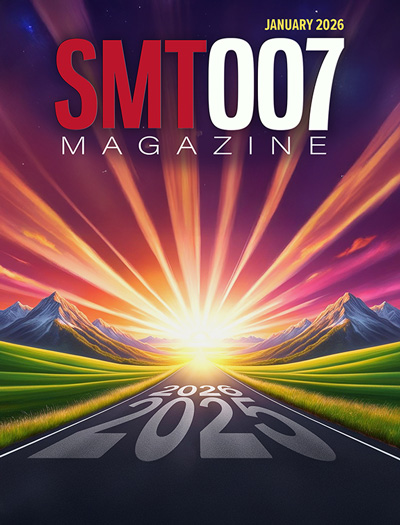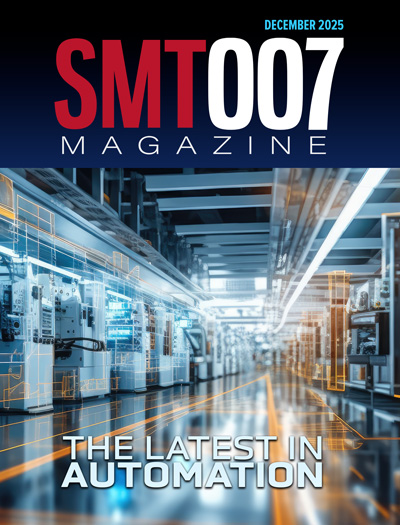-

- News
- Books
Featured Books
- smt007 Magazine
Latest Issues
Current Issue
A Look Back at 2025
Innovation rippled across the entire electronics supply chain in 2025, from semiconductor packaging and substrate materials to denser boards and more robust designs. This issue explores these defining moments and what we can expect in the year to come.

The Latest in Automation
When customer requirements shift, responses range from new equipment to automation. Explore the newest solutions reshaping production and how today’s market dynamics are driving these trends.

Spotlight on Mexico
Mexico isn’t just part of the electronics manufacturing conversation—it’s leading it. From growing investments to cross-border collaborations, Mexico is fast becoming the center of electronics in North America. This issue includes bilingual content, with all feature articles available in both English and Spanish.
- Articles
- Columns
- Links
- Media kit
||| MENU - smt007 Magazine
IPC Releases Newest List of Standards Updates, Revisions
February 20, 2024 | IPCEstimated reading time: 2 minutes
Each quarter, IPC releases a list of standards that are new or have been updated. To view a complete list of newly published standards and standards revisions, translations, proposed standards for ballot, final drafts for industry review, working drafts, and project approvals, visit ipc.org/status.
IPC-1791D
Trusted Electronic Designer, Fabricator and Assembler Requirements
IPC-1791D provides minimum requirements, policies, and procedures for printed board design, fabrication, assembly, and cable and wire harness assembly organizations and/or companies to become trusted sources for markets requiring high levels of confidence in the integrity of delivered products.
IPC-6012F
Qualification and Performance Specification for Rigid Printed Boards
IPC-6012F covers qualification and performance of rigid printed boards, including single-sided, double-sided, with or without plated-through holes, multilayer with or without blind/buried vias, and metal core boards. It addresses final finish and surface plating coating requirements, conductors, holes/vias, frequency of acceptance testing and quality conformance, as well as electrical, mechanical, and environmental requirements.
IPC-1782B
Standard for Manufacturing and Supply Chain Traceability of Electronic Products
IPC-1782B establishes minimum requirements for manufacturing and supply chain traceability based on perceived risk. IPC-1782B applies to all products, processes, assemblies, parts, components, equipment used, and other items as defined by users and suppliers in the manufacture of printed board assemblies, as well as mechanical assembly and printed board fabrication.
IPC/WHMA-A-620E-S
Revision E—Addendum—Space and Military: Space and Military Applications Electronic Hardware Addendum to IPC/WHMA-A-620
IPC/WHMA-A-620E-S space addendum provides additional requirements to IPC/WHMA-A-620E standard to ensure the reliability of cable and wire harness assemblies that must survive the vibration and thermal excursions encountered getting to and operating in the military and space environments.
IPC-2591-V1.6
Connected Factory Exchange (CFX)
IPC-2591, Version 1.6 establishes the requirements for the omnidirectional exchange of information between manufacturing processes and associated host systems for assembly manufacturing. The standard applies to communication between all executable processes in the manufacture of printed board assemblies, automated, semi-automated, and manual, and is applicable to related mechanical assembly and transactional processes.
IPC-9203A
Users Guide to IPC-9202 and the IPC-B-52 Standard Test Vehicle
While there are a variety of industry test vehicles for the examination of material compatibility, the IPC-B-52 test board was created to meet the needs for testing both ion chromatograph and surface insulation resistance (SIR), which would be more representative of the manufacturing materials and processes. IPC-9203A standard addresses the IPC-B-52 test vehicle, which can be used to evaluate a manufacturing process, or to provide objective evidence that a chosen manufacturing material set and process are compatible from a cleanliness standpoint.
This list of standards originally appeared in the Winter 2024 issue of IPC Community. Read more articles about standards development work in each issue.
Testimonial
"Your magazines are a great platform for people to exchange knowledge. Thank you for the work that you do."
Simon Khesin - Schmoll MaschinenSuggested Items
I-Connect007 Editor’s Choice: Five Must-Reads for the Week
01/30/2026 | Marcy LaRont, I-Connect007It’s the last week of January, and it’s been pretty cold outside. That’s the best time to hunker down and catch up on your reading. Here are my top five must-reads for this week. All eyes continue to be on advanced electronics processes and packaging technology, which are highlighted in Pete Starkey’s review of the ICT winter conference in the UK, as well as Nolan Johnson’s article on inflection points, and Kris Moyer’s look forward into what will be important for PCB designers in 2026 and beyond. Candor Industries’ Sunny Patel discusses “Normalizing the Impossible” in his look forward, and Mike Jouppi contributes with his critical look at what IPC-2152 does not cover.
Beyond IPC-2152: Creating Technology-specific Current-carrying Capacity Design Charts Using Thermal Modeling
01/29/2026 | Mike Jouppi, Thermal Management LLCDesigners commonly size traces using online calculators based on IPC-2221 or IPC-2152 charts, selecting width and thickness for a given current and allowable temperature rise (ΔT). Consideration is given to parallel conductors, although this is not a practical evaluation method for most designs. An important aspect of trace heating, especially groups of traces, is the power dissipated by the conductors. Unfortunately, the power dissipation or a method for accounting for power losses in the traces/conductors or planes is not straightforward.
India’s Electronics Manufacturing Ecosystem Gears Up for IEMI 2026
01/27/2026 | Global Electronics AssociationIndia continues its acceleration as a global electronics manufacturing hub. At the heart of this momentum is Integrated Electronics Manufacturing & Interconnections (IEMI) 2026, the flagship industry platform of the Global Electronics Association.
Global Electronics Association Appoints Raj Tiwari as Country Manager to Advance Thailand’s Electronics Manufacturing Ecosystem
01/26/2026 | Global Electronics AssociationThailand continues to be one of Southeast Asia’s most important electronics manufacturing hubs, with strong capabilities across automotive electronics, industrial electronics, electrical equipment, and high-reliability manufacturing.
What’s Next for Global Electronics: A 2026 Outlook from East Asia
01/23/2026 | Sydney Xiao, Global Electronics Association East AsiaThis is the latest entry in our ongoing blog series, where Global Electronics Association experts explore the forces shaping the future of the global electronics industry.


